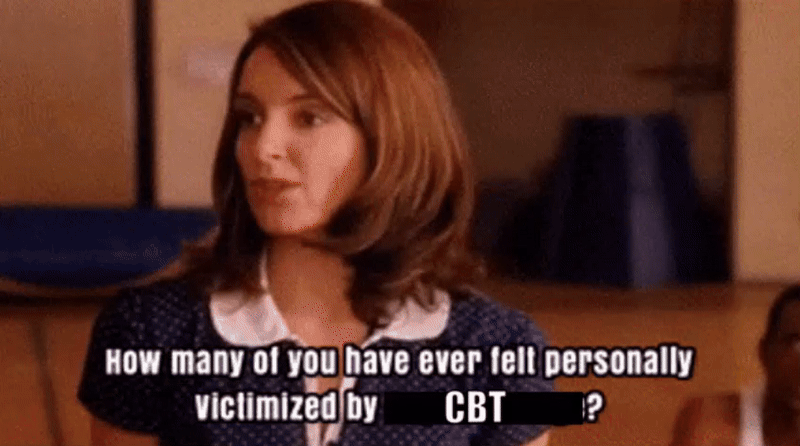I share my thoughts on CBT and why it’s not great for the BIG feels that come with ADHD, and offer a new approach with Emotion Focused Therapy.
Why CBT Doesn’t Always Work for ADHD (and What Might Work Better)
If you’d like to learn more about the window of tolerance and its positive effect on understanding ADHD, check out this connected article: Open Window, Open Mind: ADHD and Understanding Your Window of Tolerance.
In this article, I share my thoughts on Cognitive Behavioural Therapy (CBT) and why it’s not great at handling the BIG feelings that come with ADHD—and a different approach that is.
So many of my clients come into sessions and tell me the same thing:
“Ugh, CBT—it’s just not working for me!”
And honestly? I get it. As someone with an ADHD diagnosis that was first directed to CBT and had it all fall flat––“been there; done that!” The hopelessness when CBT doesn’t work the way it’s promised to for ADHD is real, and frankly, something’s gotta give.

Cognitive Behavioural Therapy (CBT) and Dialectical Behaviour Therapy (DBT) can be wonderful tools. They give people tangible, structured strategies, and for many, they really do help. But here’s the thing: if you’re not in your window of tolerance—that sweet spot where your nervous system feels safe and regulated—those CBT skills are going to be like throwing dry spaghetti at a brick wall: they don’t stick. And after a while, it will get pretty frustrating.
The Gold Standard (Isn’t Always Golden)
In my work with adults who received a late ADHD diagnosis, CBT is often the first therapy that gets recommended. It’s considered the “gold standard” for ADHD. On paper, that makes sense. But what I hear in the therapy room tells a different story. Clients come in saying:
- “I did all the homework, but the panic attacks are still here.”
- “I used the thought records, but I still wake up dreading the day.”
- “I feel like I’m one traffic jam away from losing it.”
There’s frustration, confusion, and sometimes even hopelessness when CBT doesn’t deliver the relief people expect. The skills are being practiced, but the lived experience of overwhelm, dread, or shutdown just doesn’t budge.
ADHD Isn’t Just About Thoughts
ADHD isn’t just about thoughts. For neurodivergent individuals, it’s about BIG feelings. And those feelings don’t live neatly in the mind; they live in the body.
That’s why CBT, with its focus on thought logs and worksheets, sometimes misses the mark. It often doesn’t capture the depth, nuance, or intensity of the emotional landscape that comes with ADHD. Especially in the immediate aftermath of receiving a late ADHD diagnosis in adulthood (what’s called, “the acute processing phase”).
If you’ve felt like CBT isn’t working for you, it doesn’t mean you’re “bad at therapy.” It doesn’t mean you’re “doing it wrong.” It means your brain and body may need a different doorway into healing.
If Not CBT—Then What?
Here’s the good news: there are therapies designed to meet BIG feelings where they actually live—inside the body. Emotion Focused Therapy (EFT) is one of them.
EFT doesn’t ask you to push away or rationalize your emotions. Instead, it invites you to sit with them, listen to them, and make meaning out of them. For ADHD brains, that can be a game-changer. Instead of feeling like your emotions are inconvenient or something to “fix,” EFT helps you see them as valuable signals—information that can guide you toward your needs and values.
In my experience, many clients with ADHD find EFT not only more natural, but also more empowering. It honors the emotional intensity that comes with neurodivergence rather than dismissing it. When you’re grieving the life you could have lived if you had just been given the right information, the right support, the right resources… The last thing you need is a worksheet thrown your way, or to be told that the way you’re thinking is “cognitive distortions.” Because it’s not a distortion–it’s your reality.
I wholeheartedly believe that treating adult ADHD requires us to hold space for the nuance of the big feelings that come with an adult ADHD diagnosis; like feeling pissed off that it took you so long to figure out why life felt so arduous, or confused about how to exist in this world as a neurodivergent, or ashamed because of all the negative messages you have internalized (that we want to help you unlearn!). I would argue that these are all emotions that are completely understandable, and they can’t be left out of your therapy.
I’ll tell you this much: the second I stopped trying to “fix” my ADHD with CBT––and actually started processing the big feelings I had about the whole diagnosis; grieved how much I had struggled in my life until that point; learned to accept myself as I was; and got a felt-sense of what I needed to move forward––is the second where I felt like I was moving again. Suddenly, after treating my ADHD with EFT I not only felt like I had direction, but that for the first time in a long time, I had momentum.
A Note of Hope
If you’ve recently received an ADHD diagnosis as an adult, I want to pause here and acknowledge how heavy that can feel. It’s rough out there. The world often isn’t built for neurodivergent brains, and by the time people land in my office (or on my virtual screen), they’re usually tired. Tired of trying strategies that don’t seem to work. Tired of feeling like they’re always one step behind. Tired of just surviving.
But I offer hope: things can get better. Your life can feel manageable. You can feel like you’re living again, not just hanging on by a thread.
Sometimes, it’s not about working harder at CBT. Sometimes, it’s about finding a therapeutic approach that speaks your brain and body’s language. And for many ADHD adults, that language is emotional and deeply embodied.
If CBT hasn’t worked for you, it doesn’t mean you’ve failed. It simply means your nervous system and your neurodivergent wiring need something different. And trust me, “something different” is out there. 🙂
If I’ve piqued your interest about Emotion Focused Therapy, reach out today for a Transforming Emotions free consultation and we can explore if EFT is right for you.
Rebecca is accepting new clients.
Schedule a Free 15 Minute Call with Rebecca. You can also jump straight into a first session if you’re ready.









